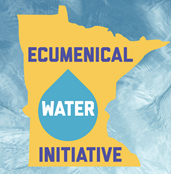By Madeline Troyer
After five special sessions of the Minnesota legislature in 2020, legislators finally passed the state’s largest bonding bill on October 15. The bonding bill included significant funding dedicated to making clean and safe water accessible to more Minnesotans. Minneapolis Area Synod and ecumenical leaders in the state, engaged through the Ecumenical Water Initiative (EWI), offered leadership and energy to ensure the inclusion of water infrastructure projects and push the bill over its last hurdles.
Water infrastructure projects are not glamorous, but they are vital to the health of Minnesota’s communities and water systems. Pastor Tyler Sit of New City Church, a United Methodist congregation in Minneapolis, said: “It’s kind of funny to think about how water infrastructure is building the Kingdom of God, but but it really is important – even though Revelation failed to mention what kind of plumbing is in heaven. Jesus came to establish a new heaven and a new earth, and that means that how we treat something as sacred as water is; in fact, it is part of our discipleship process.”
Recently the Environmental Protection Agency (EPA) estimated that Minnesota needs to invest around $7.4 billion over the next 20 years into its water infrastructure to comply with the Safe Drinking Water Act. This bonding bill is a start in guaranteeing fresh water for everyone and the church played a part in making this happen.
“Water infrastructure projects are not glamorous, but they are vital to the health of Minnesota’s communities and water systems.”
The overall bonding bill will finance $1.87 billion for projects statewide. These projects will create jobs and boost the economy while taking advantage of low-interest rates. Projects included in this bill range from infrastructure, COVID-19 relief, investment in higher education, emergency services, transportation, and more. In a report on the local CBS affiliate, Governor Tim Walz said that “this plan will help ensure every community in Minnesota prospers.”
Of the total full legislative commitment, around $300 million is being put towards water infrastructure. Some projects across the state include:
-
- $13.5 million for upgrades to the sea wall on Duluth’s Lakes walk
- $24 million for wastewater infrastructure in Oronoco
- $20.5 million for sewer and water infrastructure in a business park in Becker
- $7.5 million in District 11 for the Twin Lakes Townships water infrastructure project to help with old and insufficient wastewater systems
- $1.3 million to upgrade the Brookston area landfill, which did not have the proper lining and is leaking chemicals into the groundwater
- Around $8 million for the city of Verona water infrastructure improvements
- $858,00 for water infrastructure in Waldorf
- $8 million for Foley wastewater infrastructure
- $3.5 million for Melrose wastewater treatment facility
EWI LEADERS BEGAN advocating for water infrastructure in 2019. Isaiah Friesen, a staff member of the Minnesota Conference of the United Methodist Church, remarked how encouraged he was to see “Christians across the state advocating with their legislators, offering their voices as faith leaders, and building their own literacy about policy decisions related to climate resiliency.”

“The relentless voice of faithful members of local congregations reinforced and expanded the message of the ecumenical leaders.”
Facing into a challenging legislative session impacted by the COVID-19 pandemic, EWI leaders adapted their strategy by turning a “press conference” announcing support for the bonding bill into a Facebook “prayer conference,” where leaders prayed over the state’s waters. Presiding Elder Stacey Smith of the African Methodist Episcopal Church specifically prayed for “our waters that surround us and ground us,” while Bishop Ann Svennungsen of the Minneapolis Area Synod prayed for “the greater Mississippi watershed basin that connects us all, … for the water we drink and the water we wash our hands with, … [and] for the pipes in the ground and purification systems.”
In July, the cry continued with a published OpEd piece titled “Water infrastructure is a Matter of Faith,” written by ecumenical leaders and published in the Rochester Post Bulletin. In this article, the public was reminded that “water infrastructure has consistently been underfunded and underinvested in vulnerable communities. … Investing now is an act of loving our neighbors.”
Recognized faith leaders were instrumental in getting this bill passed. The relentless voice of faithful members of local congregations reinforced and expanded the message of these leaders.
“Facing into a challenging legislative session impacted by the COVID-19 pandemic, EWI leaders adapted their strategy by turning a ‘press conference’ announcing support for the bonding bill into a Facebook ‘prayer conference.’”
Constant letter-writing and keeping this campaign in the public eye helped with the final passage of the bonding bill after the months of revisions. Pastor Sit said, “We are in times when all eyes are on the presidential election – rightfully so – but it’s worth naming that the smaller, local fights are where we can really make a difference.” He added that this difference could not have been made without the engagement of intergenerational work and the support of young leadership.
Sharing the ritual of baptism as entrance rite into the faith, the leaders of the Ecumenical Water Initiative plan to continue to address issues arising from water problems. The believe access to clean and available water is essential for life, for building community, and for a common understanding of our relationship to God and each other.
